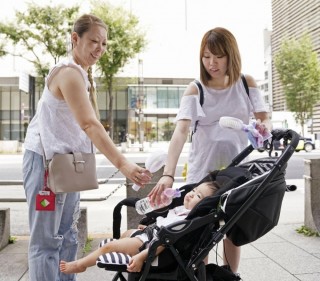Loading
Search
▼ Aging Japan's Births Fall 3.6% To 370,000 In January To June
- Category:Other
The number of babies born in Japan and to Japanese expatriates in the January to June period fell 3.6% from a year earlier to 371,052, government data showed Tuesday.
The number of births in the six-month period suggests that the annual total in the country this year is likely to stay below 800,000, after the figure hit a new record low of 799,728 last year.
But the pace of decrease in births for the first half of 2023 slowed from 5% in the same period last year, the preliminary data by the Ministry of Health, Labor and Welfare showed.
The data includes figures for Japanese nationals living abroad and foreign nationals residing in Japan.
The growing trend of people marrying later in life or not marrying at all is thought to have exacerbated the birthrate decline, according to the health ministry.
The number of marriages in the six months to June fell 7.3% to 246,332, while the number of deaths rose 2.6% to 797,716, leading to a population decline of 426,664.
Meanwhile, the government said in its annual economic and fiscal white paper released Tuesday that achieving structural wage increases is important to address the country's declining birthrate.
The number of births in Japan fell below 800,000 for the first time in 2022. The total fertility rate, which shows the estimated number of children a woman will have in her lifetime, stood at 1.26, matching the all-time low marked in 2005.
Japan experienced declines in the female population, the percentage of married people and the fertility rate of married couples between 2015 and 2020, according to the white paper.
Among working men in their 30s, the percentage that were unmarried rose as annual income fell, the white paper said. The marriage rate is low in regions where the share of nonregular workers is high, it added.
The white paper said it is important to raise the incomes of young people, calling for reduced financial burdens from rent and education and correcting the excessive burden of raising children for women.
Japan has promoted labor participation by women and elderly people in recent years as its population declines, but the country has not been able to halt the fall in labor input, the white paper said.
The report said that it will become difficult to maintain local communities and the social security system unless the country stops the plummeting birthrate.
The number of births in the six-month period suggests that the annual total in the country this year is likely to stay below 800,000, after the figure hit a new record low of 799,728 last year.
But the pace of decrease in births for the first half of 2023 slowed from 5% in the same period last year, the preliminary data by the Ministry of Health, Labor and Welfare showed.
The data includes figures for Japanese nationals living abroad and foreign nationals residing in Japan.
The growing trend of people marrying later in life or not marrying at all is thought to have exacerbated the birthrate decline, according to the health ministry.
The number of marriages in the six months to June fell 7.3% to 246,332, while the number of deaths rose 2.6% to 797,716, leading to a population decline of 426,664.
Meanwhile, the government said in its annual economic and fiscal white paper released Tuesday that achieving structural wage increases is important to address the country's declining birthrate.
The number of births in Japan fell below 800,000 for the first time in 2022. The total fertility rate, which shows the estimated number of children a woman will have in her lifetime, stood at 1.26, matching the all-time low marked in 2005.
Japan experienced declines in the female population, the percentage of married people and the fertility rate of married couples between 2015 and 2020, according to the white paper.
Among working men in their 30s, the percentage that were unmarried rose as annual income fell, the white paper said. The marriage rate is low in regions where the share of nonregular workers is high, it added.
The white paper said it is important to raise the incomes of young people, calling for reduced financial burdens from rent and education and correcting the excessive burden of raising children for women.
Japan has promoted labor participation by women and elderly people in recent years as its population declines, but the country has not been able to halt the fall in labor input, the white paper said.
The report said that it will become difficult to maintain local communities and the social security system unless the country stops the plummeting birthrate.
- August 30, 2023
- Comment (0)
- Trackback(0)


